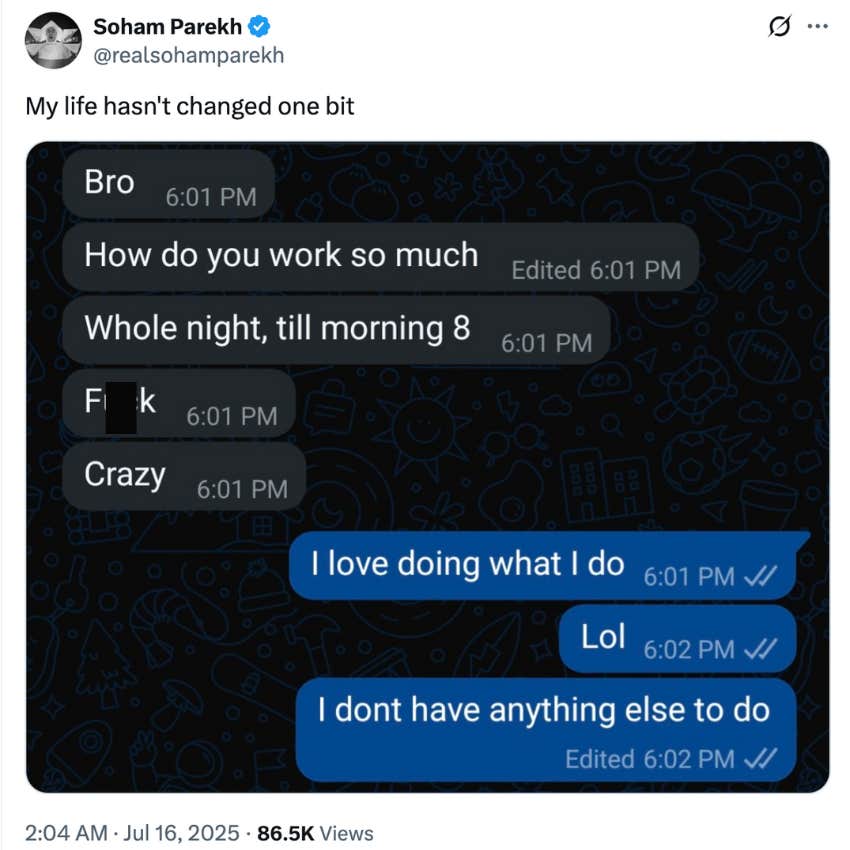Man Caught Working 4 Tech Jobs At Once Says He's Still Working 140 Hours A Week Because 'I Don't Have Anything Else To Do'
Soham Parekh's relationship with work is starting to sound pathological.
 Ground Picture | Shutterstock
Ground Picture | Shutterstock So-called "overemployment," in which people secretly work a couple of different remote jobs simultaneously, is nothing new, especially since the pandemic made working from home more common than ever before. But Indian tech worker Soham Parekh has taken the practice to a new level, essentially scamming his way into four different jobs at once. But even after a scandal erupted in which he was outed, he's still working the same punishing hours, because, he said, work is his life.
Soham Parekh said he's still working 140 hours a week, even after being outed for working four jobs at once.
Parekh's story made international headlines a few weeks ago when he was exposed by Suhail Doshi, one of the several employers he'd charmed into hiring him while he was working multiple other jobs. A scandal quickly ensued as more and more tech executives realized he'd pulled the same swindle on them as well.
But those who assume Parekh is now living in ignominy would be wrong, at least according to Parekh's claims on X. He said that "nothing has changed" since being exposed, and that he's still working 140-hour weeks—mostly by choice.
Parekh said he worked 20-hour, 7-day weeks to keep up his ruse.
Obviously, working four full-time jobs at once is going to be incredibly taxing, and Parekh is no exception. He said at the time his scandal erupted that the workload required him to work 20-hour days, seven days a week, a feat many have questioned the plausibility of.
Nevertheless, he ran one heck of a scam, and some have theorized that he did so via a combination of fraudulent documents, focusing on smaller companies that would be unlikely to do background checks, and then farming out the actual work to subcontractors once hired in order to keep up.
However, he did it, Doshi's tweet quickly made other tech CEOs realize they'd been had too. One of them, Flo Crivello, CEO of start-up Lindy, had just hired Parekh the week before. Another, Matt Parkhurst of Antimetal, revealed he'd hired and fired Parekh years ago after discovering he was running his moonlighting scam as far back as 2022.
Others noticed that Parekh seemed far more interested in equity than actual pay, and a theory emerged that the money wasn't the goal. Rather, some think he actually may have been trying to steal as much intellectual property from all of his employers as he could get his hands on. Whatever his goal, Parekh claimed he was motivated by financial need, but that story seems to have changed now.
Now he says he's working 140-hour weeks by choice because he 'has nothing else to do.'
Parekh's claims of financial hardship now feel even more implausible given his recent comments, because it seems Parekh is motivated simply by some weird pathologization of "hustle culture."
In a tweet, Parekh claimed his "life hasn't changed one bit," implying that his reputation has not been affected by the revelations. But even more striking is his reasoning for continuing to work 20 hours a day: "I don't have anything else to do."
Parekh also chalked it up to his legitimate love of his career as a software engineer. But his enthusiasm for a lifestyle that will, to put it bluntly, likely kill him has left many questioning his claim. As another X user put it, "this is either peak dedication or a cry for help." (Spoiler alert: It's definitely the latter.)
 @realsohamparekh/X
@realsohamparekh/X
It's also impossible not to think of stories like Denise Prudhomme, who died at her desk at Wells Fargo and laid there dead for days before anyone found her, or the story of Anna Sebastian Perayil, an accountant also from India who died at age 26 as a result of the punishing round-the-clock work schedule she was forced to maintain.
Nevertheless, the tech industry (not to mention X) being what they are, Parekh's update has inspired a huge wave of posts lauding his "grindset," many of them seemingly sincere. It's a bracing commentary on pretty much everything regarding the working world these days: Parekh is either a hero or a moral and ethical pariah, depending on which strain of work culture brainworms you have.
That ignores the reality, though: If it weren't for the combination of punishing economic conditions and the obliviousness on the part of business leaders that the increasingly dehumanizing automation of the hiring process allows, and the things this is all doing to workers' brains, Parekh's game wouldn't have even been possible. Is he really the problem?
John Sundholm is a writer, editor, and video personality with 20 years of experience in media and entertainment. He covers culture, mental health, and human interest topics.

